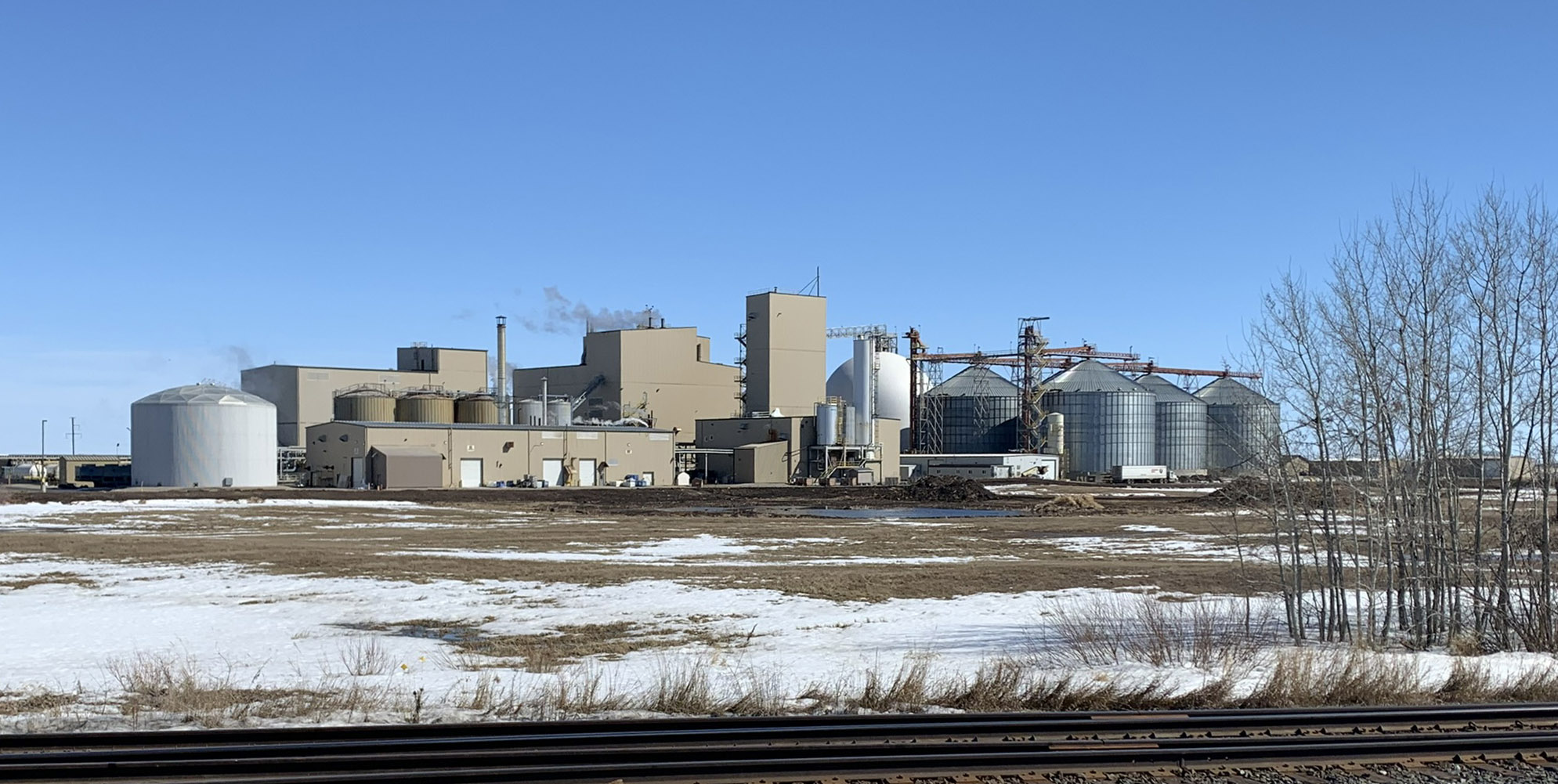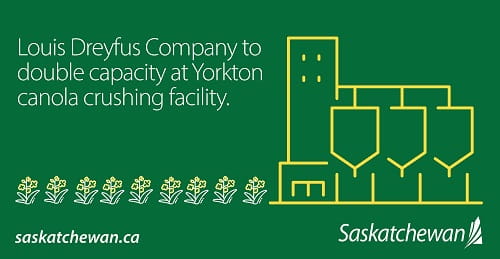Brian Zinchuk is editor and owner of Pipeline Online

Yorkton’s Louis Dreyfus canola crushing plant, on the northwest corner of the city, is upwind of much of the city.
YORKTON – Back in 2009, Louis Dreyfus built a canola crushing plant on the northwest corner of Yorkton. Immediately adjacent to it, James Richardson International (JRI) built its own canola crushing plant. In recent years, JRI doubled the size of its plant, and now Louis Dreyfus will be doing the same with its own plant.
On April 11, Government of Saskatchewan welcomed the announcement that Louis Dreyfus Company (LDC) will expand its canola crushing facility at Yorkton.
Both Yorkton expansions are part of a wave of canola crushing capacity growth in this province. Other projects include a planned hydrogenated renewable diesel facility by Federated Co-operatives Limited to be built adjacent to the Regina Refinery Complex. AGT Foods and Ingredients will be building its own canola crush facility adjacent to that renewable diesel facility, on the north end of Regina.
“This major investment by LDC is good news for Saskatchewan canola growers and good news for workers and the economy in Yorkton and right across the province,” Trade and Export Development Minister Jeremy Harrison said in a release. “This expansion brings Saskatchewan even closer to several of the 2030 Growth Plan goals, including the ambitious goal of crushing 75 per cent of the canola produced in the province. This investment strengthens the province’s position as a global leader in agriculture value-added processing and will further increase Saskatchewan’s international exports.”
According to its website, LDC is “active in more than 100 countries,” with over 165 years of experience. Its head office is in the port city of Rotterdam, Netherlands.

The facility’s new capacity will be over two million metric tons, which is more than double its current capacity. LDC initially opened the Yorkton facility in 2009 and currently employs approximately 120 people.
- 0098 SASPO-2874_Self Serve Campaign_New Connects_Youtube_v30098 SASPO-2874_Self Serve Campaign_New Connects_Youtube_v3
- 0100 Turnbull Project Manager0100 Turnbull Project Manager
- 0099 Mryglod Steel 1080p0099 Mryglod Steel 1080p
- 0097 Eagle Sky Ventures LTD0097 Eagle Sky Ventures LTD
- 0095 Fast Trucking nearly 70 years good at it0095 Fast Trucking nearly 70 years good at it
- 0053 Kingston Midstream Westspur Alameda Click Before You Dig0053 Kingston Midstream Westspur Alameda Click Before You Dig
- 0092 Turnbull projects big and small0092 Turnbull projects big and small
- 0046 City of Estevan This is Estevan Teaser0046 City of Estevan This is Estevan Teaser
- 0087 Lori Carr Coal Expansion0087 Lori Carr Coal Expansion
- 0077 Caprice Resources Stand Up For Free Speech0077 Caprice Resources Stand Up For Free Speech
- 0076 Latus only0076 Latus only
- 0061 SIMSA 2024 For Sask Buy Sask0061 SIMSA 2024 For Sask Buy Sask
- 0055 Smart Power Be Smart with your Power office0055 Smart Power Be Smart with your Power office
- 0051 JML Hiring Pumpjack assembly0051 JML Hiring Pumpjack assembly
- 0049 Scotsburn Dental soft guitar0049 Scotsburn Dental soft guitar
- 0041 DEEP Since 2018 now we are going to build0041 DEEP Since 2018 now we are going to build
- 0032 IWS Summer hiring rock trailer music
- 0022 Grimes winter hiring
- 0021 OSY Rentals S8 Promo
- 0018 IWS Hiring Royal Summer
- 0013 Panther Drilling PO ad 03 top drive rigs
- 0006 JK Junior
- 0002 gilliss casing services0002 gilliss casing services
- 9002 Pipeline Online 30 sec EBEX9002 Pipeline Online 30 sec EBEX
- 9001
Clean Fuel Standard
“This investment supports the group’s strategic growth plans by reinforcing core merchandizing activities, in this case with additional capacity to originate and process Canadian canola seeds to provide nourishment for people and livestock,” LDC Chief Executive Officer Michael Gelchie said. “It also positions LDC as a strategic feedstock provider to renewable energy producers and accelerates our contribution to a global energy transition that we are excited to be a part of.”
That “renewable energy producers and accelerates our contribution to a global energy transition” is key. One of the driving factors for massive expansion of canola crushing processing in Saskatchewan has been the implementation of the federal Clean Fuel Standard, one of a series of federal measures to reduce greenhouse gas emissions in a effort to curb anthropogenic climate change. It’s purpose is to decarbonize hydrocarbon-based fuels. The federal government website about the clean fuel standard states, “The Clean Fuel Regulations help drive innovation and create job opportunities across multiple sectors, including clean technology, agriculture and low-carbon energy sectors, such as biofuels and hydrogen.
“Under the Clean Fuel Regulations, the gasoline and diesel Canadians use every day will become progressively cleaner over time and affordable alternatives will be increasingly available to consumers. In 2020, the transportation sector accounted for 24 percent of Canada’s total emissions.”
By “progressively cleaner,” it means to replace an ever-growing proportion of diesel with hydrogenated renewable diesel and gasoline with ethanol.
This approach also means ever-increasing use of farmland and food production for fuel, instead of food for people.
While welcoming and promoting the expansion of the canola crushing industry in Saskatchewan as a long-sought-after value-added processing development, the Government of Saskatchewan has also roundly criticized the Clean Fuel Standard as “a second carbon tax.”
Growth plan
The Saskatchewan press release noted in addition to helping with the canola crushing goal, the expansion puts the province closer to meeting several other key goals outlined in Saskatchewan’s Growth Plan, including:
- Grow private capital investment in Saskatchewan to $16 billion annually;
- Increase the value of exports by 50 per cent;
- Grow Saskatchewan’s agri-food exports to $20 billion; and
- Increase agriculture value-added revenue to $10 billion.
Canola oil and canola seed were among Saskatchewan’s top three agri-food exports in 2022, with a value of $3.5 billion and $2.7 billion, respectively, the province noted.
Construction of the additional canola crushing line is expected to begin later this year.
As both the JRI and Louis Dreyfus plants were built on the city’s northwest corner, prevailing northwest winds mean on most days they are upwind of the city of Yorkton. They produce significant odours that, at times, permeate much of the city. Those odours can be quite noticeable even on the main drag, Broadway Ave, or on the opposite end of the city, in the shopping district around the Parkland Mall and Walmart.
(Full disclosure: Pipeline Online editor Brian Zinchuk’s parents’ acreage is literally the closest neighbour to both canola crushing plants, directly across the fence and tracks, and thus can fully attest to the overpowering smell.)
- 0098 SASPO-2874_Self Serve Campaign_New Connects_Youtube_v30098 SASPO-2874_Self Serve Campaign_New Connects_Youtube_v3
- 0100 Turnbull Project Manager0100 Turnbull Project Manager
- 0099 Mryglod Steel 1080p0099 Mryglod Steel 1080p
- 0097 Eagle Sky Ventures LTD0097 Eagle Sky Ventures LTD
- 0095 Fast Trucking nearly 70 years good at it0095 Fast Trucking nearly 70 years good at it
- 0053 Kingston Midstream Westspur Alameda Click Before You Dig0053 Kingston Midstream Westspur Alameda Click Before You Dig
- 0092 Turnbull projects big and small0092 Turnbull projects big and small
- 0046 City of Estevan This is Estevan Teaser0046 City of Estevan This is Estevan Teaser
- 0087 Lori Carr Coal Expansion0087 Lori Carr Coal Expansion
- 0077 Caprice Resources Stand Up For Free Speech0077 Caprice Resources Stand Up For Free Speech
- 0076 Latus only0076 Latus only
- 0061 SIMSA 2024 For Sask Buy Sask0061 SIMSA 2024 For Sask Buy Sask
- 0055 Smart Power Be Smart with your Power office0055 Smart Power Be Smart with your Power office
- 0051 JML Hiring Pumpjack assembly0051 JML Hiring Pumpjack assembly
- 0049 Scotsburn Dental soft guitar0049 Scotsburn Dental soft guitar
- 0041 DEEP Since 2018 now we are going to build0041 DEEP Since 2018 now we are going to build
- 0032 IWS Summer hiring rock trailer music
- 0022 Grimes winter hiring
- 0021 OSY Rentals S8 Promo
- 0018 IWS Hiring Royal Summer
- 0013 Panther Drilling PO ad 03 top drive rigs
- 0006 JK Junior
- 0002 gilliss casing services0002 gilliss casing services
- 9002 Pipeline Online 30 sec EBEX9002 Pipeline Online 30 sec EBEX
- 9001
